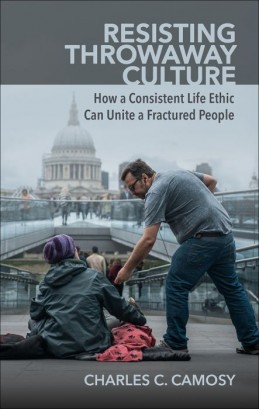"We are losing our attitude of wonder, of contemplation, of listening to creation and thus we no longer manage to interpret within it what Benedict XVI calls 'the rhythm of the love-story between God and man.'"
+ Pope Francis
Camosy’s “Throwaway Culture” is a keeper

“There are no single-issue saints.”
In sharing this observation by Archbishop José H. Gomez, Dr. Charles C. Camosy summarizes his latest project, an insightful book that covers a host of hot-button issues in an attempt to bridge divides—a much-needed goal these days.
In his own words. Camosy is attempting to “show what it might look like to live fundamental principles consistently across a range of issues.” He seeks “to focus on underlying values” not engage in “pointed discussions of policy and politics,” the kind that “currently assail and divide our culture.”
Gladly, Camosy is successful in his endeavor.
“Resisting Throwaway Culture: How a Consistent Life Ethic Can Unite a Fractured People” (New City Press, 374 pages) provides the briefest of overviews of Catholic thought on a host of issues. Then the book dives into them. The brevity of the overview is sufficient to get the point—and in this regard, Camosy does what I wish more academics of his caliber would do: write for the average person in the pew.
Camosy’s style is detailed but always accessible. It’s also refreshingly calming as he engages topics most normally heard with fire and fury.
No man is an island
Camosy’s desire to “Unite a Fractured People” is nurtured early in the book when he stresses the unity of thought between Saint John Paul II, Benedict XVI, and now Pope Francis. Those frustrated with the left-right posturing of much of the coverage of the Successors of Saint Peter—the kind that either champions or demonizes one pontiff or another—will find Camosy’s presentation refreshing.
This consistency is really the point of the book. By better understanding the Church and her non-binary approach to the ills of the world, we can better live out our faith. We can journey to the goal of sainthood by acting lovingly and sacrificially in the here and now.
To do so, Camosy argues that we need to adopt a “Consistent Life Ethic,” or “CLE.” While the meaning of the term is straightforward, its implications are vast.

Each of the twenty-first centuries pontiffs have championed a Consistent Life Ethic and has done so by offering their own unique gifts, insights, and histories: The philosophy of John Paul II, who lived through the cruelty of fascism; the deep, loving theology of Benedict XVI, who saw his people go mad with notions of monstrous superiority; and Francis, who lived among the poor and within the otherwise difficult lives of the people of Argentina—a nation that became home to many escaping the consequences of European upheavals in the twentieth century.
Of the three pontiffs, Camosy is most intrigued by Francis, especially two practical elements that he brings to a Consistent Life Ethic. “First, a negative: resisting the throwaway culture. Second, a positive: promoting a culture of encounter.”
Anyone familiar with the author’s work to date will see in this latest text the perfect pairing of his deepest concerns and his greatest hopes. Simply put, Camosy was the man to write this book. (His introduction provides biographical insights, that is, an encounter with the author, that explain the real-world foundations of “Resisting Throwaway Culture.”)
There but for the grace of God go I.
Camosy is at his best when handling divisive issues—issues like abortion, immigration, euthanasia, and state-sponsored violence. He presents his data with an academician’s precision but he does so on a human scale. He leads us to encounter an issue by encountering real men and women. Real situations.
In doing so, we meet realities that we might soon imagine could be our own.
Thus removed from abstractions and Twitter-length arguments, issues can be seen in a truer light as the beauty of Catholicism shines.
And so, this warning: Camosy’s use of a Consistent Life Ethic will likely challenge anyone who holds strongly held beliefs that fall on this or that end of the political spectrum. Camosy certainly challenged me in spots. (If I ever become an all-out vegan, it will be because of Dr. Charlie Camosy.)
Gladly, the challenges offered with “Resisting Throwaway Culture” are presented calmly and with respect. The reader may not like where the text takes him or her, but they will know that there is a truth being offered. And this is precisely what makes this book so important. After all, how can this nation—how can the Church in the United States—ever heal and unite if we won’t allow our beliefs to be challenged? If we won’t allow ourselves to see ourselves in the rich young man or the woman at the well?
Moreover, central to this challenge is the message that runs throughout Pope Francis’s eco-encyclical Laudato Si’: Everything is connected.
Or, as Archbishop Gomez noted, “there are no single-issue saints.”
Camosy will not let us remain in our comfortable restrictions. We are meant to live Christ’s teachings in all areas of our lives by caring for the alien as much as we do the unborn child. Or vice versa.
Helping us with the difficult synthesizing of issues needed to live a Consistent Life Ethic is Camosy’s use of a Thomistic series of objections and responses. The technique is not merely some academic tool that allows a deep dive into a particular issue. More importantly, this objection-response technique (and other thought experiments within the book) demonstrates the very thing that both our pontiffs and Camosy champion: a culture of encounter. Of dialogue.
“So you could not keep watch with me for one hour?”
“A primary value in throwaway culture is maintaining a consumerist lifestyle,” Camosy writes, “but to cease caring about who is being discarded, most of us find a way to no longer acknowledges their inherent dignity.”
A common means for this denial is to simply not talk to—much less associate with—those whom we wish to demonize. And Camosy won’t allow that.

Hence, the call to develop a relationship with the person whom we may seek to dismiss. As far back as the late 1950s, a young Joseph Ratzinger wrote that a Church that “seeks peace in the future is nonetheless obliged to love in the present.”
Today, Pope Francis is demonstrating what this looks like within current realities—whether personal, social, or environmental.
This tactic of encounter often gets Francis into trouble—especially with our more conservative brothers and sisters. Francis, for instance, has invited voices to Rome that are vocally pro-abortion to speak on ecological matters. He has brought the Mass of the Lord’s Supper on Holy Thursday to prisons.
But Francis happens to trust the gospel and its divine author. Jesuit that he is, he seeks to bring the gospel to others by first developing a dialogue with them. A relationship.
This makes sense when one remembers that the Word of God became flesh and dwelt among us.
For some, a culture of encounter means seeing the desperate immigrant perhaps for the first time as their neighbor. For others, encounter will challenge their expectation that one’s taxes and big government will solve the plight of the poor; whereas we are meant to help them ourselves. Directly and personally.
Finally, Camosy is to be applauded for bypassing the temptation to offer yet another political recipe for success—some policy or practice. Instead, he speaks of grace elevating nature, of a consistent, prayerful gospel-centered life.
Camosy writes that “[i]n the context of a genuine encounter we can avoid using the person we meet only as a means to the (admittedly good) end of trying to bring about social change on a given issue. It is throwaway culture, after all, that sees and uses people only as a means to an end.”
Some readers may find themselves wanting more of this or that particular Catholic view or practice—for instance, the place of spiritual warfare at the root of all this division. Others may find Camosy too optimistic in his expectation that our culture “is primed to reject divisive political assumptions,” that we “are ready for a politics of encounter and hospitality to unify us.”
But it is tempting to hope that this is so.
Indeed, if we as a nation and a Church do in fact move to a moment of healing and unity—of truly loving our neighbors—it may very well be in part because of Camosy’s insights and his game-changing new book.


















